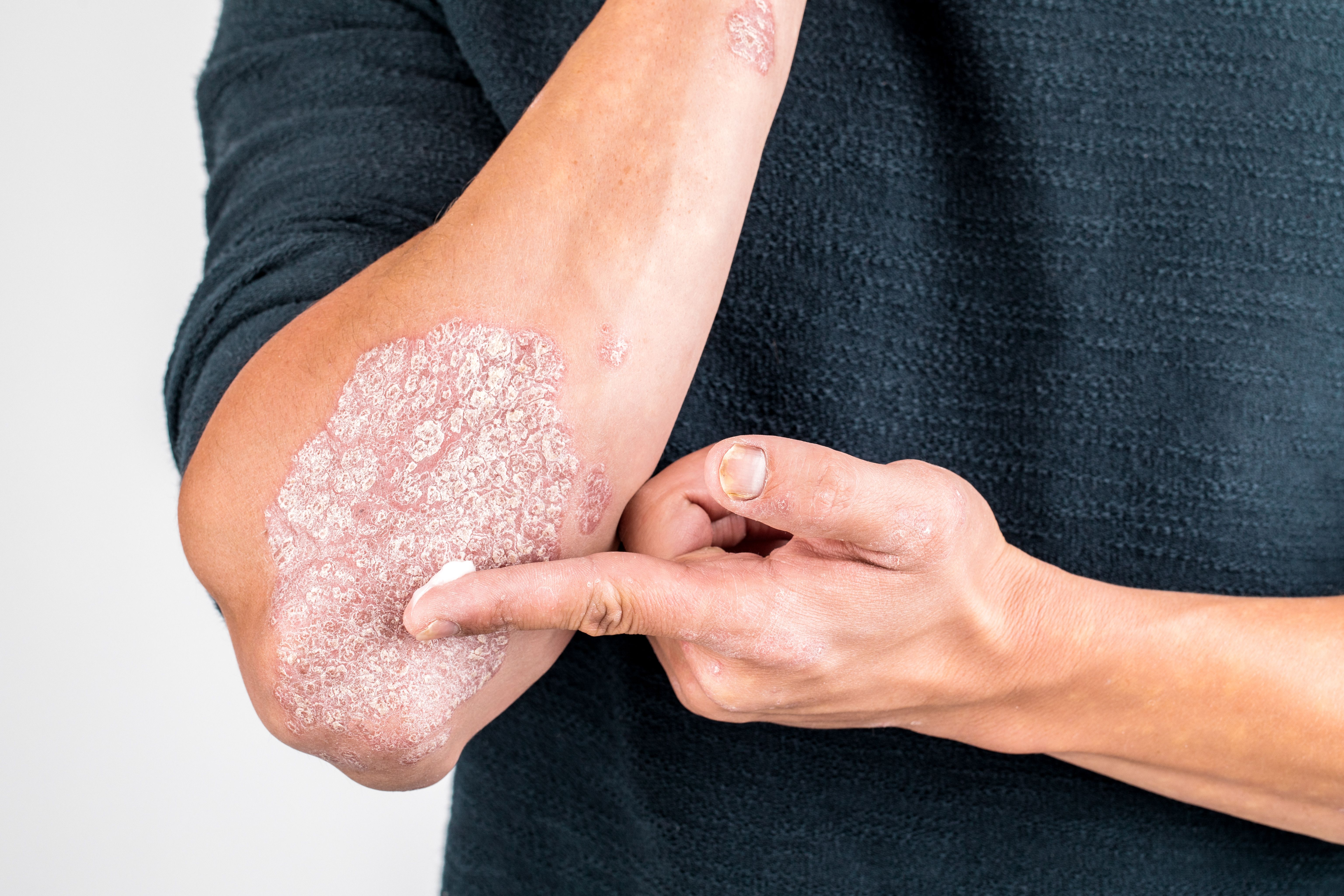- Case-Based Roundtable
- General Dermatology
- Eczema
- Chronic Hand Eczema
- Alopecia
- Aesthetics
- Vitiligo
- COVID-19
- Actinic Keratosis
- Precision Medicine and Biologics
- Rare Disease
- Wound Care
- Rosacea
- Psoriasis
- Psoriatic Arthritis
- Atopic Dermatitis
- Melasma
- NP and PA
- Skin Cancer
- Hidradenitis Suppurativa
- Drug Watch
- Pigmentary Disorders
- Acne
- Pediatric Dermatology
- Practice Management
- Prurigo Nodularis
- Buy-and-Bill
Article
Short-term systemic steroids for psoriasis efficacious despite ‘dogma’
Author(s):
Data from a recently published study reveal systemic steroids are often the choice of therapy for clinicians based in the US who treat psoriasis, yet this practice is not endorsed in clinical practice guidelines.
One of the concerns with the use of systemic steroids for psoriasis is the development of pustular flares of the disease. Photo: James Graham Dermatopathology Collection at Wake Forest University School of Medicine.
The prescribing of systemic steroids for psoriasis is frowned upon in guidelines but is a common practice in the United States, finds Steven Feldman, M.D., Ph.D., a dermatologist and professor of dermatology, Wake Forest University, Winston-Salem, N.C.
Published in the Journal of Cutaneous Medicine and Surgery in February, the study used data from the National Ambulatory Medical Care Survey (NAMCS) to evaluate how frequently systemic steroids were prescribed to treat psoriasis, covering more than 20 years, from 1989 to 2010. The investigators found systemic corticosteroids were prescribed at an estimated 650,000 of 21 million psoriasis visits. Moreover, 93 percent of these visits were to dermatologists (J CutanMed Surg. 2014;18:1-5).
To confirm their findings, investigators used a second source, MarketScan Medicaid. Data from that source demonstrated prednisone was prescribed to people with psoriasis more often than either methotrexate or the biologic agent etanercept. Moreover, use of systemic steroids for psoriasis has not been decreasing since the introduction of biologics for psoriasis.
Where's the evidence?
Traditional teaching in dermatology has been that if systemic steroids are initiated to manage extensive psoriasis, the treatment or its withdrawal poses a risk to the development of flaring disease, including pustular or erythrodermic psoriasis - conditions that can be fatal. Dr. Feldman notes there is little in the way of robust evidence to support this contention.
“We don’t have prospective data to support the established dogma,” Dr. Feldman says. “People have observed anecdotally that systemic corticosteroid use was associated with pustular flares (of psoriasis) but we don’t know that the systemic steroids caused those flares. We also know that many patients with psoriasis are receiving either short-term steroid tapers or judicious long-term, low-dose prednisone for psoriatic arthritis without apparent ill effects.
“Consider how frequently systemic steroids are used, as we saw in the survey, and how little we are seeing in the way of acute problems associated with their use,” he says, noting similarly there are no reports of high rates of pustular psoriasis in Germany, where investigators also found systemic steroids to be regularly prescribed to manage psoriasis.
Indeed, a German analysis uncovered that corticosteroids were the most frequently prescribed systemic therapy among psoriasis patients, despite systemic corticosteroids not being outlined in European treatment guidelines (Nast A, Boehncke W-H, Mrowietz U, et al. J Dtsch Dermatol Ges. 2012;10(Suppl 2):S1-S95. Augustin M, Schäfer I, Reich K, et al. JDtsch Dermatol Ges. 2011;9(10):833-838).
Next: Systemic steroids left out
Systemic steroids left out
Clinical practice guidelines in the United States and other jurisdictions do not include systemic steroids as a therapeutic choice in the treatment of psoriasis, Dr. Feldman says.
While Dr. Feldman says he does not frequently use systemic steroids in psoriasis management, clinical practice guidelines that exclude systemic steroids are based on anecdotes rather than trial evidence, and those anecdotes may not be representative of what normally happens in general, community use.
The investigators noted that the survey has limitations: it did not record the dosing of corticosteroids and did not record the duration of prescriptions.
Systemic steroids have not been widely studied as a therapy to manage psoriasis, and the frequent use of systemic steroids to manage psoriasis, as evidenced by the data from the survey, warrant their investigation in clinical trials to assess the true nature of the risk and benefit, according to Dr. Feldman.
Haines Ely, M.D., professor of dermatology at University of California, Davis, says he uses systemic steroids such as dexamethasone for moderate-to-severe presentations of psoriasis and agrees that teaching systemic steroids are contraindicated in the management of psoriasis is unfounded.
“I have no problem with the short-term use of systemic steroids for psoriasis,” says Dr. Ely, noting he has never seen a case of pustular psoriasis in his 40 years of practice in dermatology. “Saying that you don’t give systemic steroids to treat psoriasis is dogma.”
Dr. Ely’s own approach is to use low-dose steroids, such as a dosage of 0.75 mg each morning for 20 days per month, with 10 days off, in addition to pentoxifylline 400 mg three times daily, taken with food.
Short-term approach
This treatment approach - which Dr. Ely presented at a session at the annual meeting of the American Academy of Dermatology in the prebiologic era of 1996 - is aimed at eliminating tumor necrosis factor (TNF)-alpha. Dr. Ely says this combination completely eliminates TNF-alpha and can be used as a predictor of who will benefit from biologic agents.
“No one wants to put a patient on systemic steroids for life,” says Dr. Ely, noting the duration of this treatment approach is no more than six months.
Joel Schlessinger, M.D., a board-certified dermatologist in Omaha, Nebraska and president, LovelySkin.com, says the side effects associated with systemic steroids make them an undesirable therapeutic option for long-term use.
While he says he has not personally seen a case of pustular psoriasis associated with systemic steroid use, he has witnessed a host of other conditions linked to its use, such as diabetes, avascular necrosis of the hip, and dramatic psoriasis flares.
“Using steroids with their significant, attendant morbidity is clearly a reason to not adopt the practices suggested by this article,” Dr. Schlessinger says. “There is no doubt that steroid use in a lifelong condition like psoriasis can and will lead to significant morbidity. For this reason, encouraging the use of steroids as a treatment for psoriasis is unwarranted in my opinion.”
Dr. Schlessinger adds that this analysis reflects, in part, a time when biologic agents were not available and - faced with patients with limited resources - physicians may have chosen to prescribe systemic steroids.
Disclosures: Dr. Feldman has received fees for speaking and consulting, and/or research support from Amgen, Abbvie, Celgene, Galderma, Janssen, Novartis and Pfizer. Dr. Schlessinger has conducted clinical research for companies that manufacture biologic agents. Dr. Ely reports no relevant financial interests.






